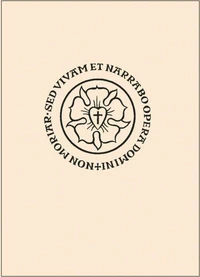Liebe und Recht. Zur Theologie der Liebe
Par :Formats :
Disponible dans votre compte client Decitre ou Furet du Nord dès validation de votre commande. Le format PDF est :
- Compatible avec une lecture sur My Vivlio (smartphone, tablette, ordinateur)
- Compatible avec une lecture sur liseuses Vivlio
- Pour les liseuses autres que Vivlio, vous devez utiliser le logiciel Adobe Digital Edition. Non compatible avec la lecture sur les liseuses Kindle, Remarkable et Sony
 , qui est-ce ?
, qui est-ce ?Notre partenaire de plateforme de lecture numérique où vous retrouverez l'ensemble de vos ebooks gratuitement
Pour en savoir plus sur nos ebooks, consultez notre aide en ligne ici
- Nombre de pages192
- FormatPDF
- ISBN978-3-374-05402-2
- EAN9783374054022
- Date de parution01/04/2018
- Protection num.Digital Watermarking
- Taille2 Mo
- Infos supplémentairespdf
- ÉditeurEvangelische Verlagsanstalt
Résumé
Dass "Liebe" und "Recht" miteinander zu tun haben, mag manchen verwundern. Doch schon Aristoteles zeigt uns: Das Recht braucht die Liebe zu seinem Bestand, und dort, wo Recht den Einzelfall nicht oder nicht hinreichend erfasst, tritt die Liebe - als Billigkeit, Epieikie - ergänzend zur Seite. Als konstitutiv für das Recht gilt seit Fichte, was Pannenberg in der Liebe entdeckt: die wechselseitige Anerkennung.
Hier knüpft auch Wolfgang Huber an, nur differenzierter: Anerkennung ist Teil der Liebe, doch Liebe ist weit mehr als nur Anerkennung. Die materiale Ergänzung des formalen Begriffs "Anerkennung" gelingt Plathow durch Einbeziehung Max Schelers, der Liebe als intuitive Erfassung von "Werten" versteht. Werte aber begründen das Recht. So liegt die konkrete Synthese von Liebe und Recht denn im Wert. [Love and Law.
On the Theology of Love] That there is a relationship between love and love may seem surprising. But already Aristotle taught: law needs love for its endurance, and when it cannot cope with the single case, love stands by additionally - as epikie, equity. What since Fichte is considered constitutive for law, Pannenberg discovers also in love: mutual recognition. Here Wolfgang Huber ties in - more differentiated: recognition is part of love, but love is far more than just recognition.
With regard to the material complementation to this formal concept, Plathow refers to Max Scheler, who sees love as an organ of knowledge, more precisely: as an organ of intuitive knowledge of "values". And values are the basis of law. Thus, the concrete synthesis of love and law is to be found in the concept of value.
Hier knüpft auch Wolfgang Huber an, nur differenzierter: Anerkennung ist Teil der Liebe, doch Liebe ist weit mehr als nur Anerkennung. Die materiale Ergänzung des formalen Begriffs "Anerkennung" gelingt Plathow durch Einbeziehung Max Schelers, der Liebe als intuitive Erfassung von "Werten" versteht. Werte aber begründen das Recht. So liegt die konkrete Synthese von Liebe und Recht denn im Wert. [Love and Law.
On the Theology of Love] That there is a relationship between love and love may seem surprising. But already Aristotle taught: law needs love for its endurance, and when it cannot cope with the single case, love stands by additionally - as epikie, equity. What since Fichte is considered constitutive for law, Pannenberg discovers also in love: mutual recognition. Here Wolfgang Huber ties in - more differentiated: recognition is part of love, but love is far more than just recognition.
With regard to the material complementation to this formal concept, Plathow refers to Max Scheler, who sees love as an organ of knowledge, more precisely: as an organ of intuitive knowledge of "values". And values are the basis of law. Thus, the concrete synthesis of love and law is to be found in the concept of value.
Dass "Liebe" und "Recht" miteinander zu tun haben, mag manchen verwundern. Doch schon Aristoteles zeigt uns: Das Recht braucht die Liebe zu seinem Bestand, und dort, wo Recht den Einzelfall nicht oder nicht hinreichend erfasst, tritt die Liebe - als Billigkeit, Epieikie - ergänzend zur Seite. Als konstitutiv für das Recht gilt seit Fichte, was Pannenberg in der Liebe entdeckt: die wechselseitige Anerkennung.
Hier knüpft auch Wolfgang Huber an, nur differenzierter: Anerkennung ist Teil der Liebe, doch Liebe ist weit mehr als nur Anerkennung. Die materiale Ergänzung des formalen Begriffs "Anerkennung" gelingt Plathow durch Einbeziehung Max Schelers, der Liebe als intuitive Erfassung von "Werten" versteht. Werte aber begründen das Recht. So liegt die konkrete Synthese von Liebe und Recht denn im Wert. [Love and Law.
On the Theology of Love] That there is a relationship between love and love may seem surprising. But already Aristotle taught: law needs love for its endurance, and when it cannot cope with the single case, love stands by additionally - as epikie, equity. What since Fichte is considered constitutive for law, Pannenberg discovers also in love: mutual recognition. Here Wolfgang Huber ties in - more differentiated: recognition is part of love, but love is far more than just recognition.
With regard to the material complementation to this formal concept, Plathow refers to Max Scheler, who sees love as an organ of knowledge, more precisely: as an organ of intuitive knowledge of "values". And values are the basis of law. Thus, the concrete synthesis of love and law is to be found in the concept of value.
Hier knüpft auch Wolfgang Huber an, nur differenzierter: Anerkennung ist Teil der Liebe, doch Liebe ist weit mehr als nur Anerkennung. Die materiale Ergänzung des formalen Begriffs "Anerkennung" gelingt Plathow durch Einbeziehung Max Schelers, der Liebe als intuitive Erfassung von "Werten" versteht. Werte aber begründen das Recht. So liegt die konkrete Synthese von Liebe und Recht denn im Wert. [Love and Law.
On the Theology of Love] That there is a relationship between love and love may seem surprising. But already Aristotle taught: law needs love for its endurance, and when it cannot cope with the single case, love stands by additionally - as epikie, equity. What since Fichte is considered constitutive for law, Pannenberg discovers also in love: mutual recognition. Here Wolfgang Huber ties in - more differentiated: recognition is part of love, but love is far more than just recognition.
With regard to the material complementation to this formal concept, Plathow refers to Max Scheler, who sees love as an organ of knowledge, more precisely: as an organ of intuitive knowledge of "values". And values are the basis of law. Thus, the concrete synthesis of love and law is to be found in the concept of value.



